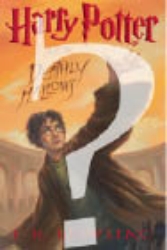Summer reading
The popularity of Harry Potter presents a dilemma for Christian parents. Should we try to protect our children from dangerous influences by putting up barriers to the toxic culture or should we arm them and send them out to fight -- the choice between the fortress and the sword.
It depends on the child’s age, temperament and ability to take on challenges. Some children rebel against protection; others don’t want to be pushed into confrontation. It also depends on the degree of dangers. There is no question that witchcraft is dangerous. To engage in it is a moral sin and, given the popularity of the occult, responsible parents should warn their children in the most explicit manner possible about its dangers.
Can the Potter series be dangerous? Yes, if it encourages a child (or for that matter an adult) to explore the occult. However, the fact that a novel deals with magic, witches, and wizards is not enough to ban it from our bookshelves. The great classics of children’s literature, C. S. Lewis’ “The Chronicles of Narnia” and J.R.R. Tolkien’s “The Lord of the Rings,” both deal with these themes.
Yes, the Potter books and films are scary, but it is not the mindless evil one sees in modern horror films. The Bible has some really violent parts. The battle between good and evil is scary and the possibility that evil will triumph is real.
The Potter series is a classic story of the battle between good and evil. The villain -- Lord Voldemort, with his desire for absolute power -- is the very personification of evil. But we also see how this inevitably leads to his fear of death. We see in Voldemort how evil carries within itself the seed of its own destruction.
In the series we also see how the other characters are tempted and struggle against jealousy and despair. The key to analyzing the moral qualities of a novel is to note how the hero triumphs and here Harry Potter offers positive lessons, for it is by love and the willingness to die for others that evil can be conquered. Harry is saved as a baby by his mother’s willingness to die for him, and in the end ... but it would be wrong to reveal the end. Suffice it to say that Rowling is true to her overarching theme of the power of love and sacrifice to conquer the most powerful evil.
In an age desperately in need of real heroes, Harry Potter and his friends give us an example of true heroism. Love is the conquering force, the love of parents for children, the deep love of true friendship, the deep respect between students and teachers. These are real loves, not erotic adventures. Potter’s world knows nothing of our sex-soaked society where men and women use each other as objects. In Potter’s world, the love between man and woman leads to marriage and children, and couples are bound forever.
There are also minor but important lessons in virtue. Rowling illustrates the evil of racism, bigotry, and bullying and the importance of hard work, study, kindness, perseverance, and courage, and the duties of fathers toward their children are stressed in a particular way. The overriding lesson is that even in a world so different from our own, family values matter. Redemption is possible even for the most loathsome.
All this is not to say that children left unguided will gain these lessons from the novels. Children need to be guided through complex works of fiction. Parents should, as a rule, read what their children are reading and be ready to discuss it with them. Great novels give us a shared vocabulary with which we can discuss good and evil, virtue and temptations, tests and trials. The Potter books offer a myriad of opportunities for such discussions.
We can also use this last novel to discuss religious themes. For example, Rowling uses two quotes from Scripture on tombstones -- one from the Sermon on the Mount (Mt 6:21) and the other from I Corinthians 15: 26. Parents can encourage their children to read the quote in context. Is Rowling giving us a clue as to her own sentiments?
All in all, with caveats, “Harry Potter” makes good summer reading.
Dale O’Leary is an internationally recognized lecturer and author of “The Gender Agenda: Redefining Equality.”



















